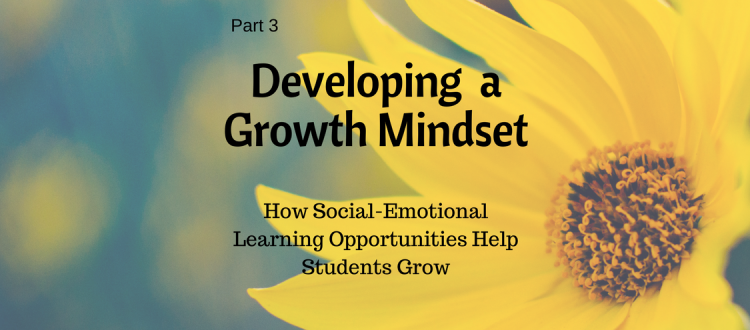Educating the Whole Child – How Social-Emotional Learning Opportunities Help Students Grow
Teaching is more than just a curriculum framework. It is about building relationships and the social and emotional skills of our students too. This is part three of a three part series about how social-emotional learning (SEL) opportunities help students grow, and specific ideas to help make that happen in your class.
Part 3: Developing a Growth Mindset
When talking with children during the school day, I always heard someone say, “Well, I’m just not good at math” or “I didn’t get the answer right away so I stopped.” That was always very frustrating to me. We were only in fifth grade and some students were already willing to accept that they would “never be good at math” just because they were currently struggling or because a parent passed along their own bias and classroom experiences that influenced their child’s beliefs. How could I get them out of the fixed mindset that they would “never be good” at a subject or the resilience to persevere through challenges?
Yet….
What if I could turn that thinking around? When I heard students talk like this, I asked them what they were good at. Some were good at Minecraft. Some were good at soccer. Others were good at drawing, whistling, flute, hair braiding, or using fidget spinners. We then talked about how they got good at it. I heard responses such as “I play it all the time” (i.e. practice, effort) or “I really love doing it.” (i.e. interest) I would ask my gamers how many times they failed a game the previous night yet kept on trying to master a level. I challenged them to reconsider their thinking with one powerful word. Yet.
When students have a fixed mindset that they are not good at something, or they lack interest because they don’t connect the importance of what they are learning to their life, they have no vision about how to grow as a thinker. Through a growth mindset, though, their outlook can change. I asked my students to add the word “Yet” to some of their fixed mindset comments and this turned into an opportunity for growth.
“I am not good at math…yet.”
“I can’t do this…yet.”
“I made a mistake…yet I have learned something new.”
Mistakes help us improve, not define who we are
When we add that powerful little word, it opens a door for students to change and grow. It shows a child that even if they are not successful now, they can be successful later with the support of good teaching, practice, and effort.
Do a quick search on “bulletin board growth mindset” images to see examples of different ways that teachers try to change a fixed mindset into a growth mindset. We want our students to ask, “What am I missing?” instead of just saying “I don’t get it.” Isn’t it more empowering to understand that mistakes help us improve, not define who we are?
Easy Peasy Lemon Squeezy
Another way of helping students develop a growth mindset is the action of self-reflection. When we ask students to reflect on a night’s homework, a unit assignment, or a team project, we empower them to consider their actions and how that impacted the outcome. I often asked students to write me a brief note on an assignment they turned in. I asked them to be truthful so I could get them the help they needed to grow as a math student or a reader. As students started realizing that I wasn’t expecting “I’ve got it!” or “Easy peasy lemon squeezy!” every time, I started seeing some honest reflections.
“This was hard.”
“I had help from my sister.”
“I don’t get it.”
Yet….with some additional coaching and support, the real learning took place.
 Barb Bailey is the Director of Learning at LearningPlunge, Inc. She has a Master of Education degree and 15 years of teaching experience. Barb is committed to providing high quality educational resources for all children. Reach out to her at [email protected].
Barb Bailey is the Director of Learning at LearningPlunge, Inc. She has a Master of Education degree and 15 years of teaching experience. Barb is committed to providing high quality educational resources for all children. Reach out to her at [email protected].









